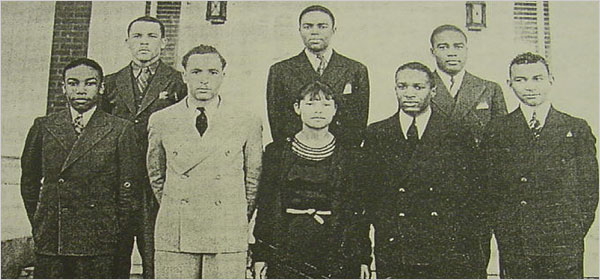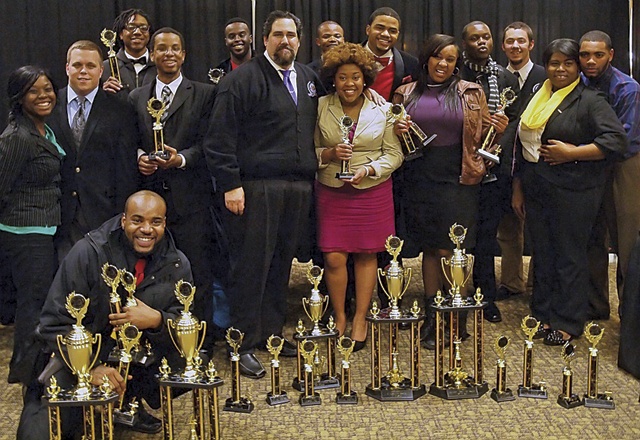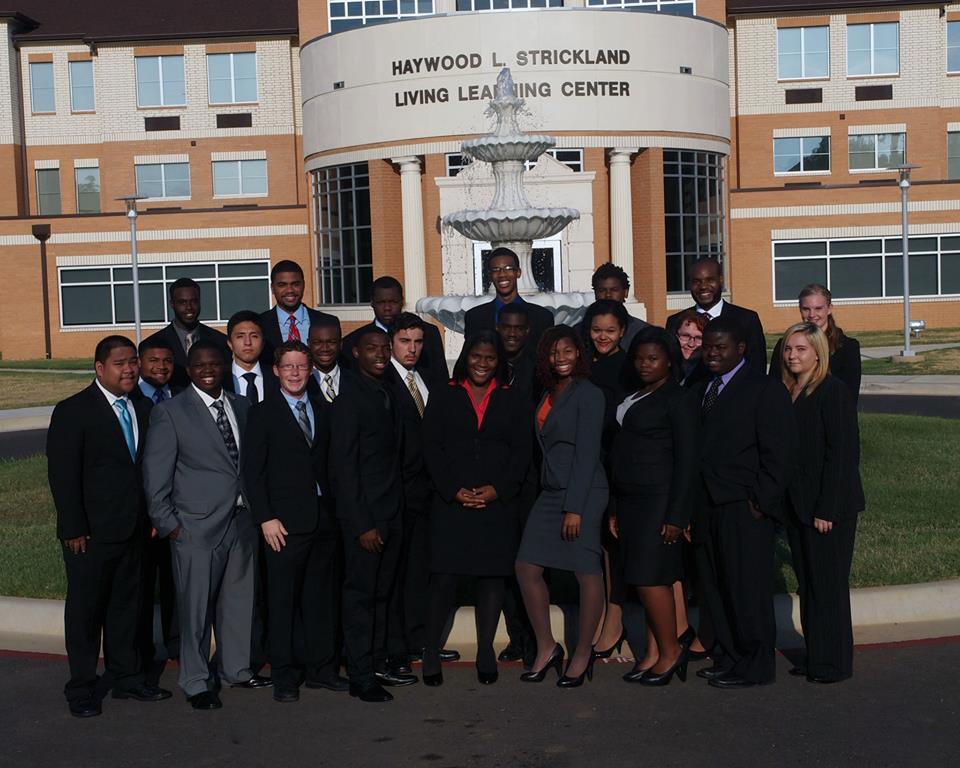
Good Morning POU!
Today we celebrate the incredible debate teams of Wiley College.
Wiley College is a four-year, private, historically black, liberal arts college located on the west side of Marshall, Texas. Founded in 1873 by the Methodist Episcopal Church’s Bishop Isaac Wiley and certified in 1882 by the Freedman’s Aid Society, it is notable as one of the oldest predominantly black colleges west of the Mississippi River.
Wiley is an open admissions college and about 96 percent of students receive some financial aid.
It was Tony Scherman’s article about the Wiley College debate team for the 1997 Spring issue of American Legacy that sparked a renewed interest in its historic achievements. The Wiley staff learned that over a 15-year period beginning in 1924, Melvin B. Tolson’s debate teams lost only one of 75 debates. The Wiley Forensic Society competed against historically black colleges, but earned national attention with its debates against the University of Southern California and Harvard University. The success of the 1935 Wiley College debate team was the subject of a 2005 documentary, The Great Debaters, The Real Great Debaters of Wiley College, which received heavy play around Texas. This was followed by 2007 dramatic movie, The Great Debaters, directed by and starring Denzel Washington. In 1935, the Wiley College debate team defeated the reigning national debate champion, the University of Southern California (depicted as Harvard University in The Great Debaters).
In a 1939 departmental report, Tolson described the program’s achievements in its first decade:
“Wiley College initiated intercollegiate debating among Negro institutions in the Southwest. For ten years the forensic representatives of the college went undefeated, meeting debaters from Fisk, Morehouse, Virginia Union, Lincoln, Wilberforce, and Howard universities. . . . (T)he debaters also participated in the first inter-racial debate ever held in the history of the South. It was held in Oklahoma City against the University of Oklahoma City in 1930. Since that time Wiley debaters have engaged in many such contests against Michigan University, Texas Christian University, and the University of California, Southern California and New Mexico.”
Not permitted to join the national forensics society organization, Pi Kappa Delta, Tolson created his own Greek-named speech and debate fraternity, Alpha Phi Omega, which served historically black colleges. By the time Henrietta Bell, called by Tolson simply “Bell,” joined the five-member team, Wiley College and Tolson had garnered such a formidable reputation that he was able to schedule debates with the best black colleges and universities in the nation, institutions twice or three times the size of Wiley, which had fewer than 500 students. From Chicago to Houston, Tolson’s teams could fill the largest halls available to them with paying patrons. Profits from these encounters not only paid the team’s expenses, important in the midst of the Great Depression, but also added to the general revenue of the struggling institution they represented.
“Our debate squad reads hundreds of magazine articles and scores of books on government, economics, sociology, history and literature,” champion debater Hobart Jarrett wrote for an article in W. E. B. Du Bois’s The Crisis. “Then we must learn to handle our knowledge with readiness and poise growing out of mastery of the platform. . . . groping for words or an error in grammar is an unpardonable sin. Sometimes our coach will put a debater on the platform during practice and cross-examine him for an hour. The debater must escape from the most perplexing dilemmas and antinomies.”
Jarrett also wrote: “Interracial debates are a real adventure for both Negro youth and white youth. For centuries the Caucasian has believed that his superiority lies in his brainpower. Debates involve a direct clash of intellects. There was a time when white colleges thought that debating against a Negro institution was mental dissipation, but that view has passed forever. Negro teams have shown that they are as capable as their white opponents despite the library handicaps that limit research. I know several instances personally in which white coaches and debaters of white universities have admitted the superiority of certain Negro debate teams.”
African American teams faced one obstacle never encountered by their white counterparts. Almost every debater during this period either observed or was threatened with lynching. Jarrett’s experience occurred on the way to Memphis. “The Wiley debaters are on the road and the road leads through the tremendous circle of mobsters. But there is a mulatto in the car. Coach Tolson tells him to take the steering wheel. The darker debaters [and Tolson, who had a dark complexion] get down in the car. The night is friendly, protecting. The mulatto salutes nonchalantly the grimfaced members of the mob, allaying their suspicions. And the debaters reach Memphis and read about the mob in the morning newspapers.”
Hamilton Boswell who came to Wiley from Los Angeles specifically to join the team under Tolson, told of being warned of a lynching in progress in Carthage, TX while returning to Marshall from a debate in Beaumont. At first Tolson elected to detour around the town, but later changed his mind and decided to travel straight through town with Boswell, who was fair-skinned, driving. Benjamin Bell accompanied Tolson to Ruston, Louisiana, where Tolson was to make the commencement address for a high school graduation. In it, he excoriated the audience on the implications of the lynching, the previous day of four African Americans in a nearby town. Tolson ended the speech with, “Where were you good folks when these men were lynched?” Bell said the sheriff, chief of police, and several members of the school board, all white, were in the audience. The local black residents advised Tolson and Bell to leave as quickly as possible by a back road, advice the two men followed. Farmer, relating some of those experiences to a meeting of the National Conference of Methodist Youth at Miami University in Oxford, Ohio, in 1936, told of a partisan debate over a motion to call on the U.S. Congress to pass an anti-lynching law. Southern delegates were opposed, citing the usual arguments supporting state’s rights. Finally, Farmer said, he got the attention of the chairman, made an impassioned speech, and ended with his peroration, “Everyone here wants to stop lynching. The only question is how long do we have to wait. How long, oh Lord, how long? The purpose of this motion is not to damn the South and the many decent people who live there. It is not to open old wounds, but to heal those who have scabbed over while still festering underneath. The motion seeks not to whip the South or hurt its people. The motion is to stop lynching now!” Farmer said he sat down to thunderous applause and a voice vote to pass the amendment.
Tolson was recruited by Langston University in 1947 and unfortunately the debate team was disbanded at Wiley and popularity of the mental sport diminished nationwide.
In 2007, Denzel Washington announced a donation of US$1 million to Wiley so the team could be re-established.
The Wiley College Debate Team, now also known as the Melvin B. Tolson/Denzel Washington Forensics Society of Wiley College, is under the direction of Christopher Medina. The purpose of The Wiley College Debate Team per Professor Medina, is not only to compete at a national and regional level, but also to instill a strong work ethic, a drive for academic excellence, and a spirit of ethical competition in its student leaders.
The Wiley College debate team of 2014 would once again reclaim the mantle, “The Great Debaters.” The 23-person team met the best speakers and debaters from 80 colleges and universities sent by 26 states to the Pi Kappa Delta Comprehensive National Tournament staged in Indianapolis, Indiana. This was the largest Pi Kappa Delta Tournament in their 101-year history. The Great Debaters came away in first place. When the winning totals from the debates and individual events – 2000 entries in all – Wiley College was named champion.
The victory holds special meaning for the Historically Black College. Not only was it the first national speech and debate title won by an HBCU, another moral victory was won. During Melvin B. Tolson’s tenure, Wiley College had not been permitted to join the national forensics fraternity, Pi Kappa Delta, or to participate in its national convention or national championship.
The college has also seen its enrollment shoot up 50 percent since The Great Debaters put it back in the national spotlight for the first time in decades.
When the movie was released in the winter of 2007, Wiley carried about 925 full- and part-time students. It eclipsed 1,400 five years later and now boasts a few students shy of that.
Read more about The Great Debaters here.



